HISPANIC-BRITISH CONVERSATIONS – Jorge de Juan: «Cervantes Theatre wants to be part of the rebirth that is to come and we hope to be»

This week we begin a series of interviews with personalities from the Spanish-British sphere. Our first guest, Jorge de Juan, is the founder and artistic director at Cervantes Theatre. He will tell us about the beginnings of the theatre, how the crisis of COVID-19 affects his work and also, his plans for the future.
Jorge de Juan (Cartagena, 1961) is a renowned Spanish producer, director, and actor. He trained at the Royal School of Dramatic Art in Madrid as well as the British Theatre Association. Directing credits include: The Public and The Grain Store (Fourth Monkey); End of the Rainbow; Dracula; The 39 Steps The Woman in Black (Spanish production); Blood Wedding, The Judge of the Divorces… and others, The House of Bernarda Alba and Yerma (STC).
As an actor, he has appeared in more than 20 plays, 30 films and many TV series. In 1990 he won the Francisco Rabal Film Award for his starring role in El Mejor de los Tiempos and the Turia Theatre Award for his performance in La Mujer de Negro, 1998. As a director, his film Bala Perdida, starring David Carradine, received both Best Film and Best Soundtrack at the Mostra de Valencia Cinema awards.
De Juan also founded and opened the Cervantes Theatre in November 2016. It is the proud accomplishment of the Spanish Theatre Company (STC), a charity which brings the best Spanish and Latin American theatre to London and British audiences in order to promote the Spanish language and dramatic arts. The theatre stages a combination of STC productions and performances of Spanish and Latin American plays from other theatre companies. The Instituto de Cervantes in London and Acción Cultural Española (AC / E) actively support the work of Cervantes Theatre in London.
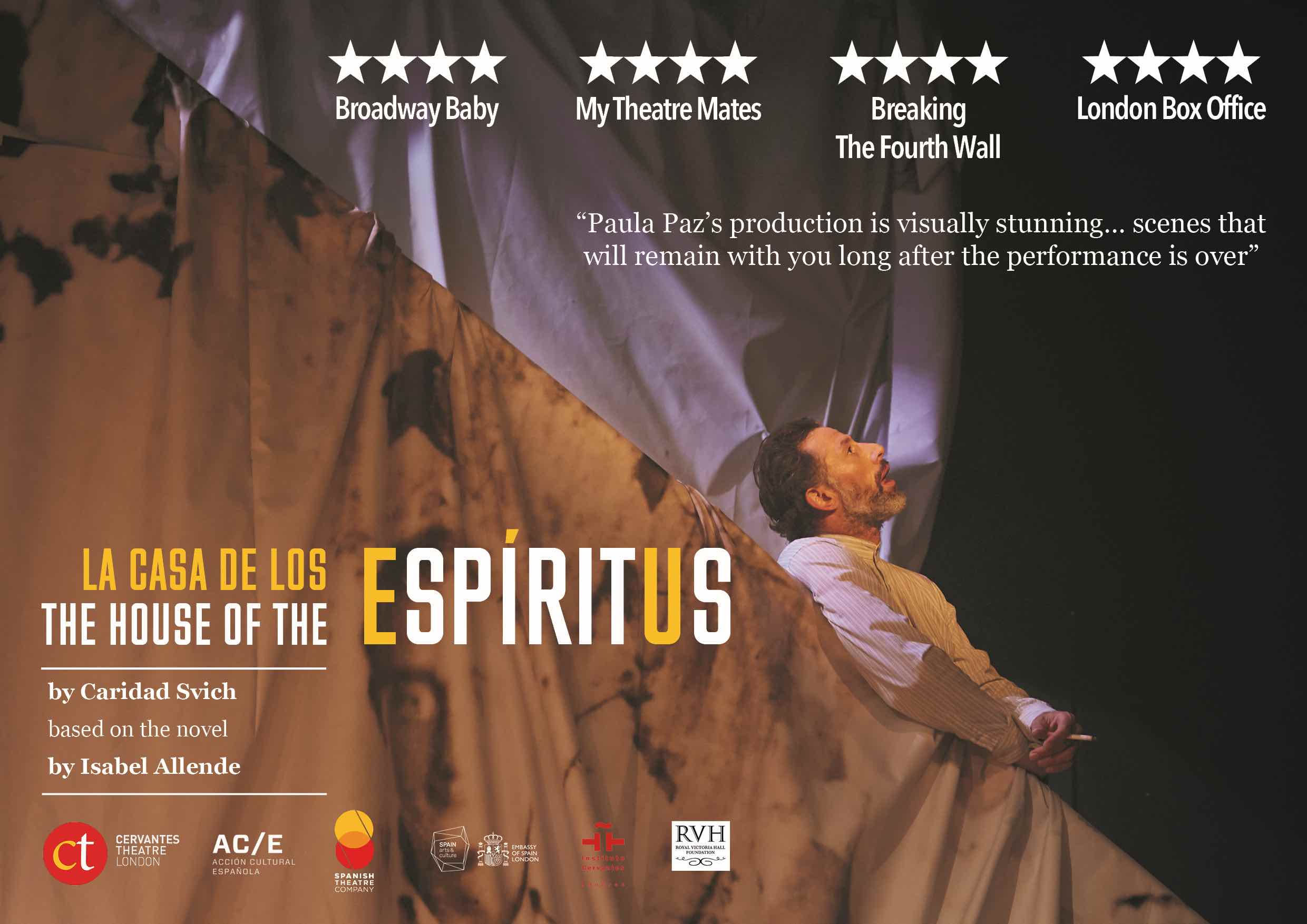
What were your beginnings in theatre? And why did you choose London?
I studied Theatre Arts in London when I was 19 years old. I intended to work with the Royal Shakespeare Company, but José Luis Gómez auditioned me for his staging of Oedipus Rex and subsequently, Jaime Chávarri arrived with his Bicycles are for the summer and so, I came back and stayed in Spain. My good friend and teacher, Jorge Eines, told me that I had a pending debt with London and here I am; I took advantage of the fact that I sent my daughter to study here when she was 15 years old and came to be closer to her. Together with Paula Paz, we created the Spanish Theatre Company and began to do Dramatised Readings in different theatres. Later, the Southwark Council put us in touch with Network Rail about a new scheme that they were planning in Union Street. The scheme threw us into the madness of building the first Spanish-speaking theatre in the history of British theatre and we did it – with very few resources! – but that’s a very long story …
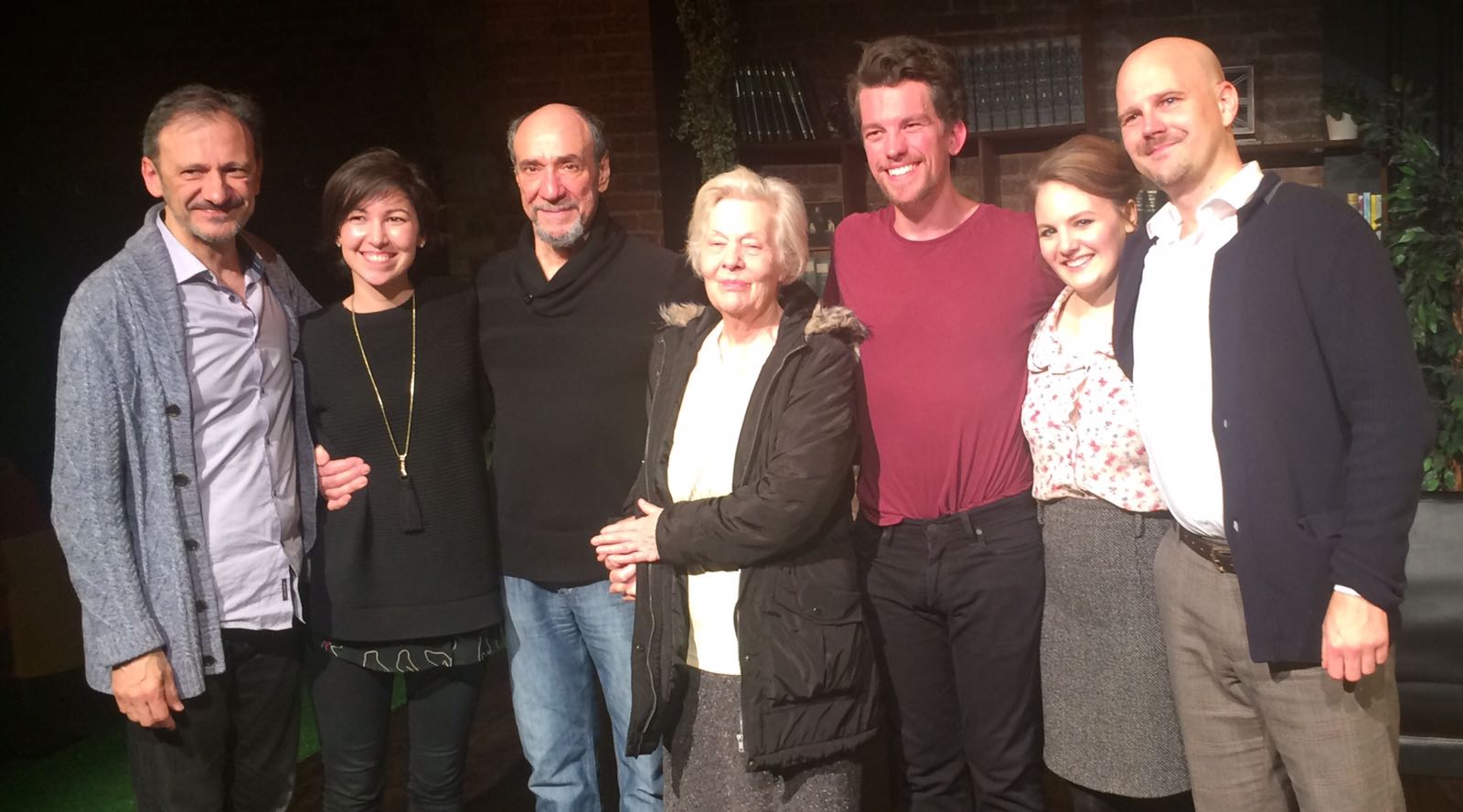
What is the most beautiful moment you remember from this journey?
The people who helped us, the faces of the audiences at the end of performances; the schools that came from Brussels on a single day return to see The House of Bernarda Alba, or even the ones who flew in from Belfast! Once, an old woman came to me in tears after seeing Yerma and told me: «I have been living in London for 27 years and to be able to live what I have lived here today with Lorca, in my language, I have no words, I am really excited, please keep it up, do not falter !”.
Students in all different professions who want to do theatre and you see that you change their lives in realtime. People who have met and related to our plays and our theatre: the huge family that we have created is beyond exciting.
How does the COVID-19 crisis affect the Cervantes Theatre?
We have closed the theatre, cancelled the tour; we have gone home and all the plans we had are frozen. Additionally, the potential Spanish aid expected for next year is now possibly delayed because of the virus and our future is very uncertain. We only have the resources to pay the theatre’s rent for two months and, after that, we may cease to exist altogether. We will do everything we can, but there is a lot of uncertainty.
Either way, I can’t stop thinking that there are many people who are going to lose their jobs. Everyone of us will undergo a radical change in our lives – we are not alone in this and we all have to join in solidarity. Only through solidarity can we withstand this brutal and unexpected blow to the very roots of our society.

In addition, you have had to cancel the tour of La Casa de Bernarda Alba. What were you able to achieve despite the cancellation? What did you learn from the tour?
We were able to do Birmingham and Leeds tours. We were meant to proceed to Belfast and Bristol and we were also in talks with other venues to continue the tour due to the success we were having.
It was spectacular to see the theatres full of students, the Spanish community and British lovers of Spanish culture, listening to Lorca and reacting to this play in a way that surprised me.
I am left with a phrase they said in Leeds: “Thank you for coming where no one ever comes with works like this and giving us the opportunity to enjoy it; please come back!”.
Cervantes Theatre operates as a charity, what can theatre lovers do right now to help you?
Right now we are asking for as much help as possible to resist the closure. There are already some people reacting and we have received donations. Others have also registered in our Friends Scheme (Membership Scheme). I have no words to thank them but I am moved to know of our importance to people and it is for them – and for everyone who values what we do – that we continue with the strength to fight against the virus and its impact on our industry . For anyone who would like to contribute, please head to our website: www.cervantestheatre.com.
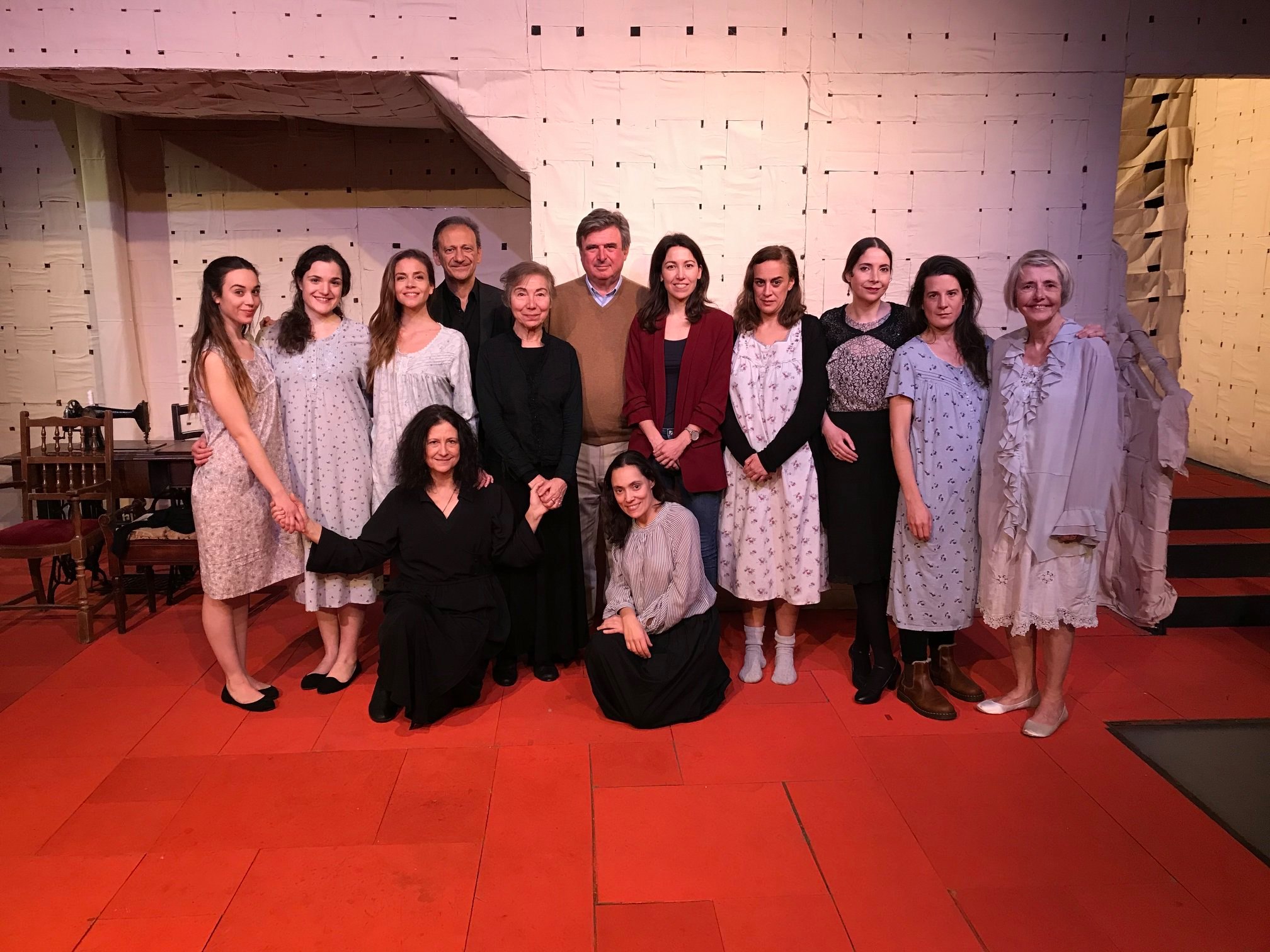
What programme do you hope to complete this year?
We had planned to dedicate the year to the «Spanish Golden Ages 1530-2020», to take a tour of Spanish creativity from the Golden Age to the present day. It was a programme that would have lasted two years (next November would have been our five year anniversary) but, as you can imagine, it’s now all in the air. We were going to continue showing theatre, poetry, music but now, honestly, I don’t know …
Why do you consider the work done by Cervantes Theatre to be so important?
I don’t think I should be the one to answer this question. But in three and a half years since we first opened, we have tripled the size of our audience. Everything was going very well and the impact we were having, despite the few resources we had, was spectacular.
Nevertheless, even when we will return to «normality», our country will face an unprecedented economic and social challenge. We will have to take very important measures internally as well as externally. With our space, in our humble way, we will continue to communicate that «normality» in a country like the United Kingdom with so many economic and cultural ties to Spain.
Culture, Industry, Tourism and Foreign Affairs should be our interlocutors when the social machinery starts up again and we want to be part of this social rebirth. This is what we hope will come and what we hope to be.
We are here for you! ¡Estamos contigo!
We all have to #StayAtHome but #InstitutoCervantesContigo keeps looking after their students, and now, more than ever, they are learning #Spanish with their teachers, using the online tools in a new and fun way.
We are here for you!
Todos tenemos que seguir el consejo #QuédateEnCasa pero #InstitutoCervantesContigo sigue cuidando a sus alumnos. Ahora, más que nunca, están aprendiendo español con sus profesores, utilizando las herramientas en línea de una manera nueva y divertida.
¡Estamos contigo!
Important notice: classroom based group lessons transferred to online mode and suspension of the cultural activity of Instituto Cervantes in the United Kingdom
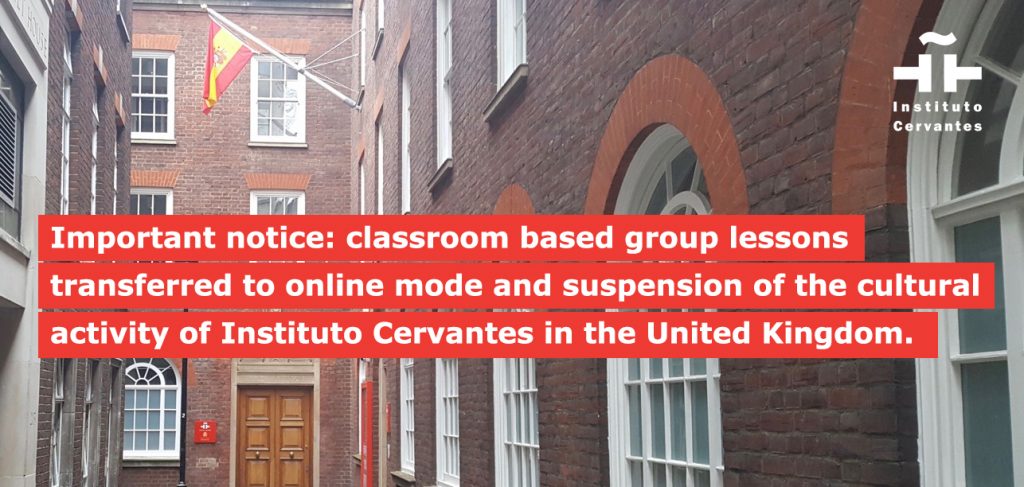
Due to the health alert caused by coronavirus COVID-19, Instituto Cervantes in the United Kingdom, following British and Spanish authorities’ guidelines, has decided, in order to protect the health of all involved, to transfer its classroom based group lessons to online platforms and to suspend its cultural programme in the centers of London, Manchester and Leeds until further notice.
Please kindly check Instituto Cervantes in Manchester and Leeds’ websites for further details and announcements.
MEASURES FOR LONDON:
Academic activity: classroom based group lessons are suspended from Tuesday, March 17th. We will start teaching our classes remotely from Friday, March 20th.
Tuesday, March 17th, Wednesday, March 18th and Thursday, March 19th there will be NO group based class of any kind and these sessions will be moved at the end the course timetable.
The teacher in charge of each group will contact their students as soon as possible to give them precise details about the implementation of the classes on line, and about the recovery of 17th, 18th, and 19th on March sessions, when applicable.
We will continue to teach our classes remotely until the end of the present term.
- The Spanish AVE Global on-line courses, as well as the rest of the Instituto Cervantes’ on-line teacher training, are still in operation.
- The CCSE exam scheduled for March 26th in London goes ahead
- DELE exams in May are suspended. Students who registered will be contacted by Instituto Cervantes to reschedule their exam to July or September.
- All the scheduled cultural activities are postponed
- Our libraries will remain closed and the deadline for returns of any borrowed items will be extended accordingly. All the services of our electronic library will remain available. You may find additional information on the YouTube channel of each center (London, Manchester, and Leeds).
Please follow us here as well as on our website and our social networks for further updates of the situation and notification of the normalization of our activities.
For any questions or additional information, you can contact us via email in London (cenlon@cervantes.es), Manchester (cenman@cervantes.es) and Leeds (cenlee@cervantes.es).
Instituto Cervantes will continue to collaborate with authorities by conveying our plans and data and following the recommendations given in order to limit the spread of the COVID-2019 coronavirus.
Instituto Cervantes en Reino Unido: Aviso importante sobre clases ‘online’, exámenes oficiales y actividad cultural
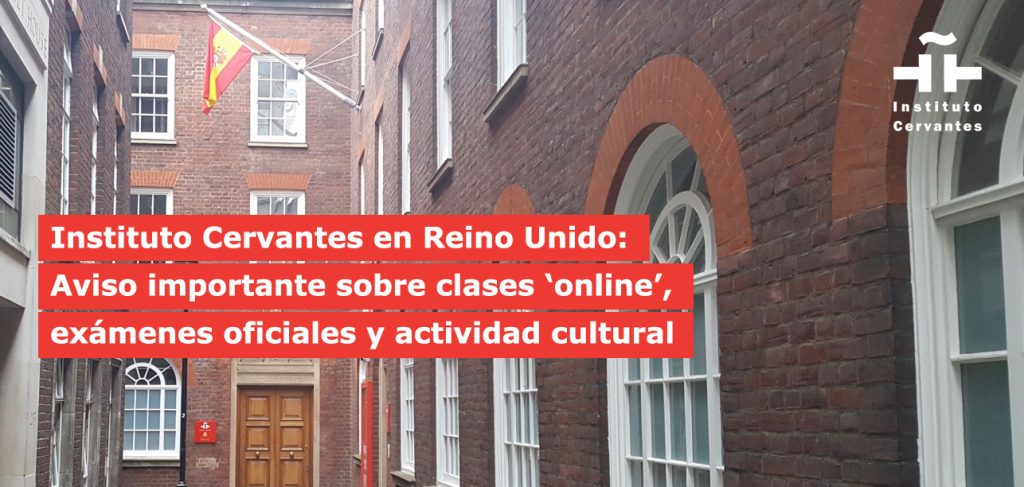
Ante la alerta sanitaria provocada por el coronavirus COVID-19, el Instituto Cervantes en Reino Unido, siguiendo las directrices de las autoridades británicas y españolas, ha decidido, con el fin de proteger la salud de todos, la transferencia de sus clases presenciales a la formación en línea y la suspensión de su programación cultural. Estas medidas afectan a los centros de Londres, Mánchester y Leeds hasta nuevo aviso.
Por favor, consulte las webs del Instituto Cervantes en Manchester y Leeds para saber más detalles y leer más avisos.
MEDIDAS PARA LONDRES
- En el ámbito académico, las clases de grupo presenciales quedan suspendidas desde el martes 17 de marzo en el centro de Londres. Continuaremos impartiendo nuestras clases a distancia a partir del viernes 20 de marzo. El martes 17, miércoles 18 y jueves 19 NO habrá clases ni presenciales ni en línea y se recuperarán al final de cada curso.
El profesor encargado de cada grupo contactará a la mayor brevedad con sus estudiantes para darles detalles precisos sobre la puesta en marcha de las clases por vía telemática y sobre la recuperación de las clases no impartidas los días 17, 18 y 19.
Los cursos de español a través de Internet Ave Global, así como el resto de la formación en línea del Instituto Cervantes, siguen operativos.
El examen CCSE programado para el día 26 de marzo en el centro de Londres sigue en pie.
Los exámenes DELE de mayo quedan suspendidos. A los alumnos inscritos se les contactará desde el centro para reagendar su examen para las convocatorias de julio o septiembre.
- Las actividades culturales programadas quedan aplazadas
- Nuestras bibliotecas permanecerán cerradas, prorrogándose todos los préstamos actuales durante el tiempo de cierre. Se seguirán manteniendo todos los servicios de nuestra biblioteca electrónica. Sugerimos asimismo consultar el canal de Youtube de cada centro (Londres, Mánchester, Leeds).
Rogamos seguir con atención todas las comunicaciones realizadas por este medio, así como las publicaciones de nuestro portal y de nuestras redes sociales, pues iremos informando puntualmente de la evolución de la situación, y avisaremos también a través de ellos de la normalización de nuestras actividades.
Para cualquier consulta o información adicional, se puede contactar con nosotros a través de los correos electrónicos de Londres (cenlon@cervantes.es), Mánchester (cenman@cervantes.es) and Leeds (cenlee@cervantes.es).
En el Instituto Cervantes seguiremos prestando la máxima colaboración a las autoridades y llevando a cabo, con el mayor esmero y la mayor celeridad posibles, cuantas recomendaciones se indiquen con el fin de evitar la propagación del coronavirus COVID-2019.
STATEMENT BY INSTITUTO CERVANTES IN THE UK ON COVID-19 (CORONAVIRUS)
In light of the recent health alerts regarding the Coronavirus, we would like to assure you that the centres of the Instituto Cervantes in UK (Leeds, London and Manchester) remain open, with courses and events continuing as usual. We are keeping track of any new information or advice from Public Health England, the NHS and UK Government on the matter and will adopt any recommendations accordingly. Likewise, we urge the responsibility of our students to follow the hygiene measures and indications recommended by the British health authorities:
Furthermore, due to the risk of spread of the COVID-19 virus, it is requested by both the UK and Spanish health authorities that any person who has recently travelled to China (mainland China, Hong Kong, Macao), Singapore, South Korea, Iran or Italy shall self-isolate themselves at home for a period of 14 days on their return. This applies as well to any person who has been in close contact with a confirmed case of coronavirus.
If any of the abovementioned situations apply to you, we would be grateful if you could inform us. We will then alert the HSE and follow their recommendations on risk assessment. We will implement any measures and treat any specific case following the advice of the appropriate authorities.
The health and wellbeing of our staff and students remains our top priority and we will continue monitoring the situation and acting upon the information made available to us by the HSE.
COMUNICADO DEL INSTITUTO CERVANTES DEL REINO UNIDO SOBRE COVID-19 (CORONAVIRUS)
Ante la situación creada por la alerta sanitaria debida al Coronavirus, los Institutos Cervantes del Reino Unido (Leeds, Londres y Mánchester) comunican que los centros continúan abiertos y ofrecen sus cursos y sus actividades culturales programadas. Estamos pendientes de cualquier nueva información o medida que Public Health England, el NHS o el Gobierno de Reino Unido comuniquen al respecto con el fin de adoptar sus recomendaciones. Igualmente, instamos a la responsabilidad de nuestros alumnos para que sigan las medidas de higiene e indicaciones recomendadas por las autoridades sanitarias británicas:
Por otro lado, debido al riesgo de propagación del virus COVID-19, tanto las autoridades sanitarias del Reino Unido como las españolas solicitan que cualquier persona que haya viajado recientemente a China (China continental, Hong Kong, Macao), Singapur, Corea del Sur, Irán o Italia se aísle en casa por un período de 14 días a su regreso. Esto se aplica también a cualquier persona que haya estado en contacto cercano con un caso confirmado de coronavirus.
Si usted está en alguna de las situaciones mencionadas anteriormente, le agradeceríamos que nos informara cuanto antes. El Instituto dará parte al HSE y seguiremos sus recomendaciones sobre la evaluación de riesgos. Implementaremos cualquier medida y trataremos cualquier caso específico siguiendo el consejo de las autoridades correspondientes.
La salud y el bienestar de nuestros estudiantes y nuestro personal ha sido y sigue siendo nuestra prioridad principal y continuaremos monitorizando la situación y actuando de acuerdo con la información que HSE pone a nuestra disposición.
Instituto Cervantes comes to Scotland

The director of Instituto Cervantes, Luis García Montero, and the head of the Spanish Department of the University of Aberdeen (Scotland, United Kingdom), Jesse Barker, signed an agreement for academic and cultural cooperation that makes the university an official examination centre for the Spanish Diploma (DELE) administered by Cervantes.
The signed agreement integrates the School of Language, Literature, Music and Visual Culture of the University of Aberdeen into the network of Instituto Cervantes’ examination centres in the United Kingdom. The first exams will be held next May with the support of Instituto Cervantes in Manchester (England), the centre to which the agreement is attached.
With the agreement signed in the third most important city in Scotland, the presence of Instituto Cervantes in the north of Great Britain is being reinforced, with the aim of meeting the growing interest of British students to obtain the DELE diploma and internationally recognised certification of a command of Spanish.
The University of Aberdeen joins three other Scottish educational centers that hold DELE exams: the University of Strathclyde (Glasgow), the Edinburgh College (Sighthill Campus) and SALT Edinburgh: Academy of Language and Translation in Edinburgh. The number of candidates in Scotland increased by 60% in 2019 compared to the previous year, and a similar growth is expected in 2020.
«Spanish Ambassadors»
The presence of Instituto Cervantes in the north of the United Kingdom, and in Scotland in particular, has been reinforced in recent years. This is attributable to the joint planning of cultural activities with Scottish universities from the centre of Manchester with a focus on history, art, literature and cinema. The Spanish cultural offer includes the launch of the «Luis Buñuel Film Club» at the universities of Aberdeen and Strachclyde (Glasgow) and the «Spanish Ambassadors» programme, aimed at young university students interested in spreading the Spanish language and the Spanish-speaking culture.
García Montero has also met with the heads of the Spanish departments of four other Scottish universities (Edinburgh, Dundee, Strachclyde and Saint Andrews) og which he thanked for their work in promoting Spanish whilst also encouraging them to propose initiatives that increase the Students’ interest in the Hispanic world. The Spanish Consul General in Edinburgh, Ignacio Cartagena Núñez, and the director of the Cervantes Institute in Manchester, Francisco Oda-Ángel, participated.
On the invitation of the Lawyers Without Borders Students Association of the University of Aberdeen, Luis García Montero also participated in the VI Annual Human Rights Congress, whose central theme revolved around the freedom of artists in the promotion of fundamental rights.
El Instituto Cervantes aumenta su presencia en Escocia

El director del Instituto Cervantes, Luis García Montero, y el responsable del Departamento de Español de la Universidad de Aberdeen (Escocia, Reino Unido), Jesse Barker, firmaron un convenio de cooperación académica y cultural que convierte a dicha universidad en centro oficial examinador del Diploma de Español (DELE) que administra el Cervantes.
El acuerdo suscrito integra a la School of Language, Literature, Music and Visual Culture de la Universidad de Aberdeen en la red de centros de examen del Instituto en el Reino Unido. La primera convocatoria se celebrará el próximo mes de mayo con el apoyo del Cervantes de Mánchester (Inglaterra), centro al que está adscrito el acuerdo.
Con el convenio firmado ayer por la tarde en la tercera ciudad más importante de Escocia, se refuerza la presencia del Instituto Cervantes en el norte de Gran Bretaña, con el objetivo de atender el creciente interés de los alumnos británicos por obtener el diploma DELE, certificación internacional de dominio del español.
La Universidad de Aberdeen se suma a otros tres centros educativos escoceses que celebran exámenes DELE: la Universidad de Strathclyde (Glasgow), el Edinburgh College (Sighthill Campus) y SALT Edinburgh, Academia de Lengua y Traducción en Edimburgo. El número de candidatos en Escocia aumentó en 2019 un 60% respecto al año anterior, y en 2020 se espera un crecimiento similar.
«Embajadores del español»
La presencia del Instituto Cervantes en el norte del Reino Unido, y en particular en Escocia, se ha reforzado en los últimos años gracias a la planificación conjunta de actividades culturales con las universidades escocesas desde el centro de Mánchester, en especial sobre historia, arte, literatura y cine. En la oferta cultural en español destacan la puesta en marcha del «Club de Cine Luis Buñuel» en las universidades de Aberdeen y Strachclyde (Glasgow) y el programa «Embajadores del español», destinado a jóvenes universitarios interesados por difundir la lengua española y la cultura hispanohablante.
García Montero se ha reunido además con los responsables de los departamentos de Español de cuatro universidades escocesas (Edimburgo, Dundee, Strachclyde y Saint Andrews), a quienes ha agradecido la labor en la promoción del español y les ha animado a proponer iniciativas que aumenten el interés de los alumnos por el mundo hispánico. Han participado el cónsul general de España en Edimburgo, Ignacio Cartagena Núñez, y el director del Instituto Cervantes de Mánchester, Francisco Oda-Ángel.
Invitado por la Asociación de Estudiantes Lawyers Without Borders de la Universidad de Aberdeen, Luis García Montero ha participado también en el VI Congreso Anual de Derechos Humanos, cuyo tema central ha girado sobre la libertad de los artistas en la promoción de los derechos fundamentales y donde ha impartido una conferencia.
Oxford celebra su “valiosa relación” con el Instituto Cervantes en el cincuentenario de la Facultad de Español
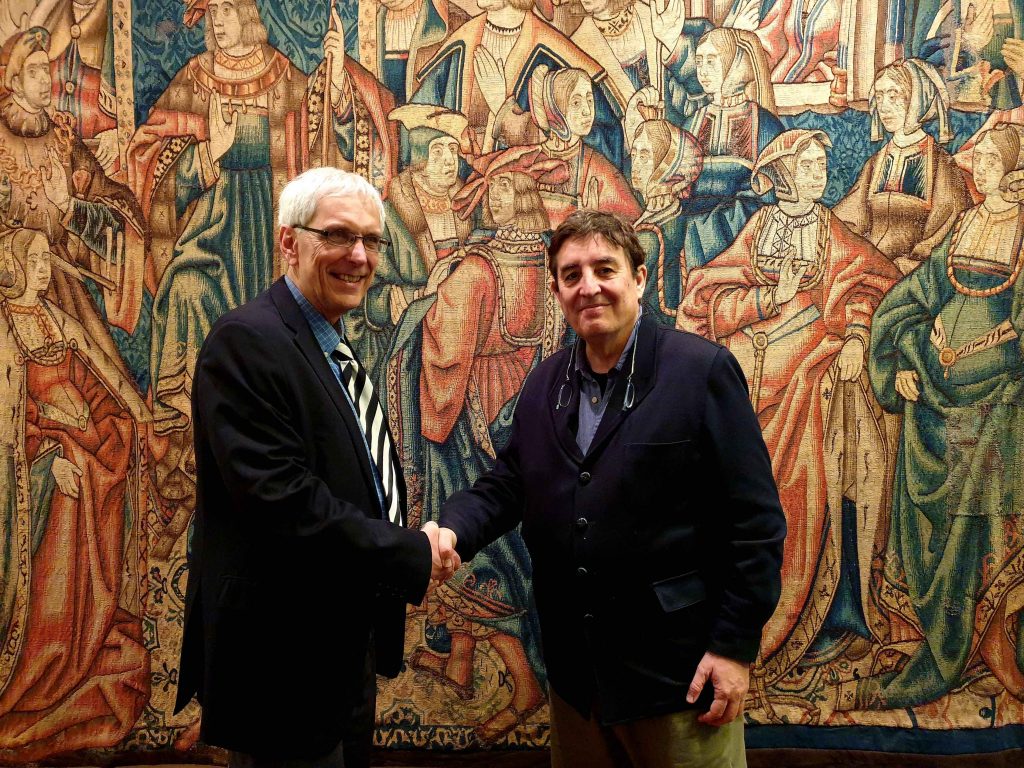
El director del Instituto Cervantes, Luis García Montero, acudió hoy a las celebraciones del 50 aniversario de la Subfacultad de Español y Portugués en la Universidad de Oxford y firmará mañana un memorando de entendimiento (MOU) con Magdalen College.
“La participación del Instituto Cervantes en esta conmemoración se debe a que nuestra relación es muy valiosa”, reconoció el profesor Jonathan Thacker, catedrático Alfonso XIII de estudios españoles en Oxford, quien explicó que si bien el español se enseña en esta universidad desde hace más de 100 años, es ahora cuando siente que “es una lengua realmente vibrante”.
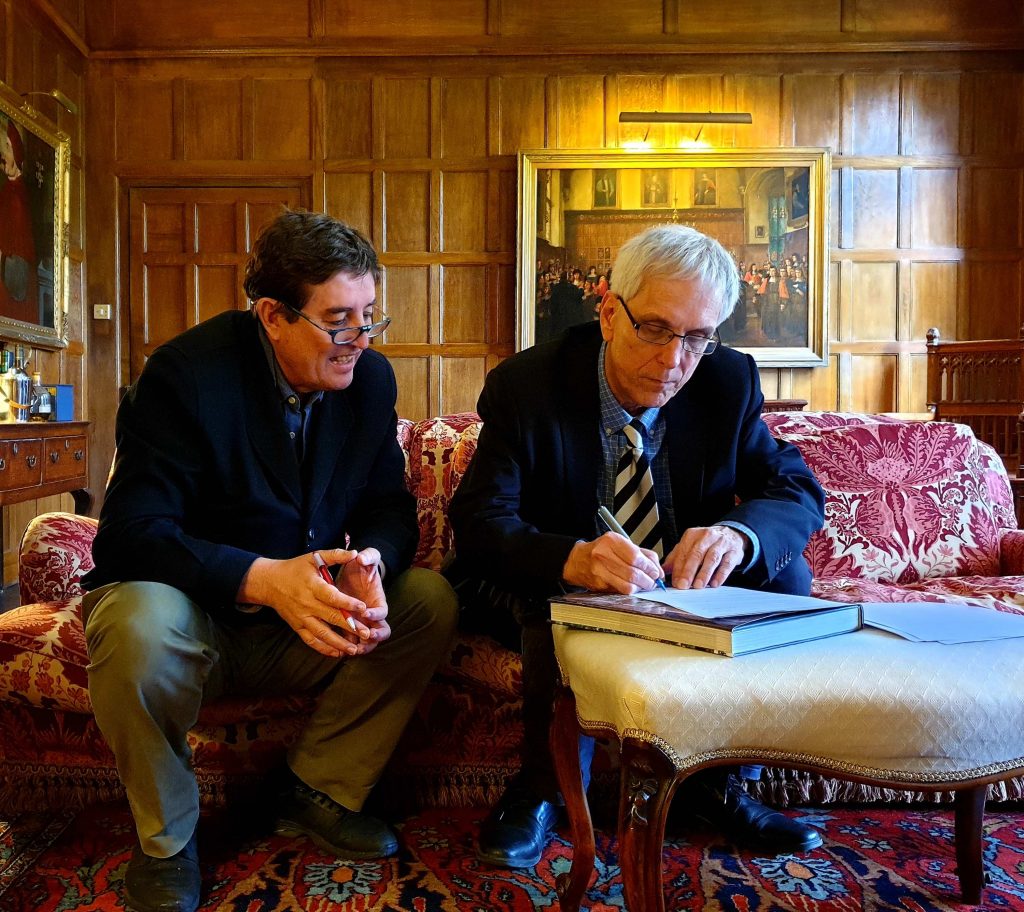
Experto en el Siglo de Oro español, el profesor Thacker afirmó que la asistencia de García Montero “no solo se debe a que es el director de una institución cultural muy importante, sino también un académico y un poeta, produciendo un tipo de literatura que enseñamos en Oxford. Queríamos que esta celebración fuese una combinación de contenido académico y un contenido más vivo”. En concreto, hubo lecturas de poesía del propio García Montero y la escritora portuguesa Ana Luísa Amaral.
Memorando de entendimiento con Magdalen College
“Este convenio es un reconocimiento de una trayectoria que lleva en marcha unos cuantos años y la consolidación de una colaboración futura que deseo que sea muy larga. Se trata de poner en negro sobre blanco lo que lleva tiempo desarrollándose, en especial en estos dos últimos años”, destacó el profesor de Literatura y Filología Medieval Española en la Universidad de Oxford, Juan Carlos Conde.
Para Conde, de lo que se trata con la firma de este memorando es de dar “carta de naturaleza y asegurarla para el futuro”. De hecho, tiene claro que la presencia de español en Oxford se ve fortalecida con dos iniciativas que se mencionan en el MOU: el Ciclo Madariaga y el Seminario de Estudios Medievales Ibéricos Magdalen (MIMSS, por sus siglas en inglés).
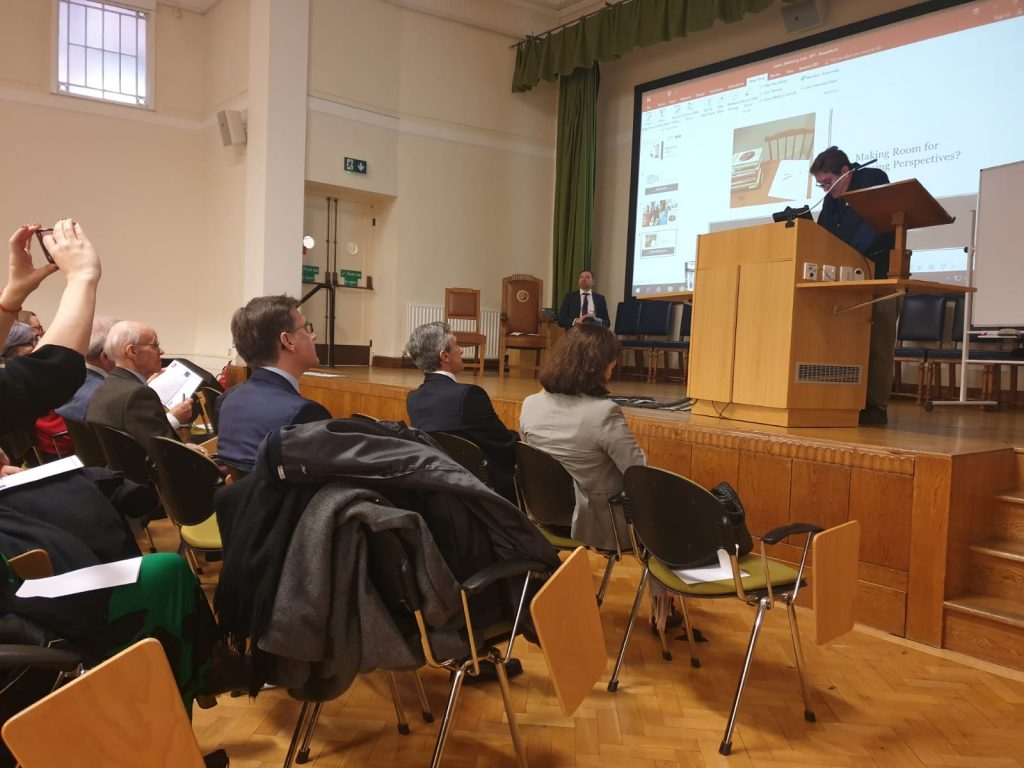
El Ciclo Madariaga surgió fruto de una iniciativa de un grupo de estudiantes de postgrado a finales de 2014. Entre los primeros invitados en 2015 hubo figuras de la talla de Miguel Ángel Moratinos o Javier Solana. Uno de los estudiantes detrás de la iniciativa, Diego Rubio, se dirigió a Conde para que Magdalen College le diese voz y visibilidad en Oxford y así fue como meses más tarde “les dio casa, techo y cobijo, así como una significativa contribución económica”. Y en el caso del ciclo MIMSS, se trata del seminario de estudios medievales más importante de Reino Unido en la actualidad.
“Quiero creer que estas actividades, en paralelo a la docencia y la formación, contribuirán a que la experiencia de los actuales y futuros estudiantes de Oxford sea más rica, proporcionándoles una serie de oportunidades que no tienen en otros lugares”, destacó Conde.
Estudiantes de español en Oxford
“Para estudiantes de grado que quieren estudiar aquí, tienen que haber cursado español previamente, hasta los exámenes de A-levels. Tenemos una media de entre 300 y 320 estudiantes que solicitan estudiar aquí y aceptamos entre 70 y 75, es decir, a uno de cada cuatro estudiantes. Creo que esto es una señal de la buena salud de la enseñanza de español en los colegios”, reconoció el profesor Thacker.
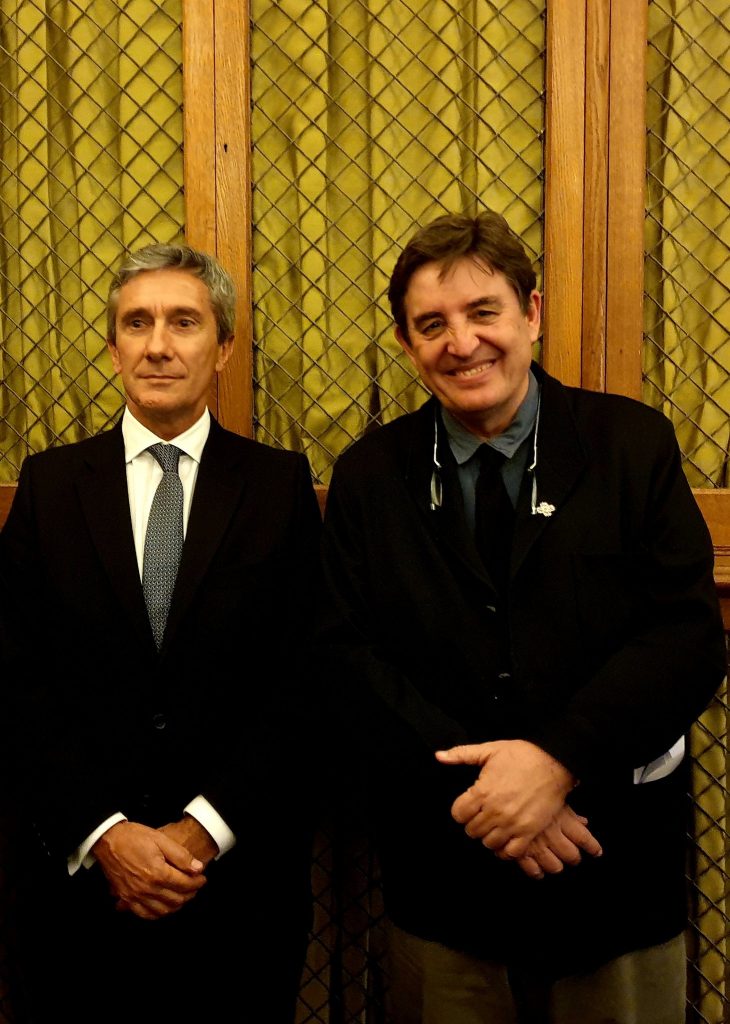
Hace 20 años, cuando el citado catedrático comenzó a trabajar en Oxford, había una media aproximadamente de 150 aplicantes para 40 puestos. “Hemos crecido bastante, pero la gran diferencia está marcada en que hay más aplicaciones por Lenguas Modernas, ya que cuando los estudiantes se postulan para estudiar aquí, tienen que escoger esa vía y luego especificar si quieren ruso, italiano, español o qué lengua”, puntualizó.
Mientras que el interés por el francés y el alemán está bajando, el español ha roto esa tendencia, y por el momento, todavía hay un buen nivel de aspirantes: “Espero que sea porque les gusta el nivel de nuestro curso, pero también porque hay mucha gente joven aquí interesada en la cultura hispánica y la historia española, y quieren viajar y les gusta viajar a países donde se habla español”.
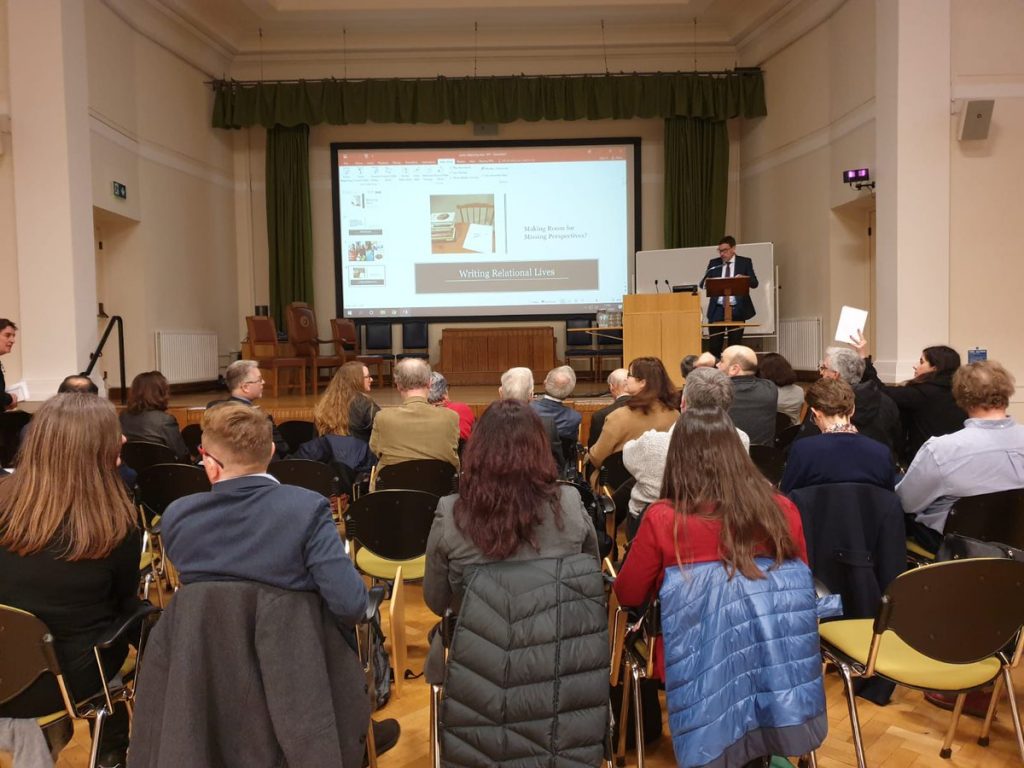
Futuro del español
A Thacker le gustaría seguir viendo al español creciendo en los próximos años y que la Subfacultad de Lenguas Medievales y Modernas en la Universidad de Oxford sea capaz de aceptar a todos los buenos solicitantes de estudios de español, tanto de grado como de posgrado, pero siempre manteniendo el nivel actual de interacción interdisciplinario y con otras Subfacultades en Oxford que hay en la actualidad.
Oxford celebrates its «valuable relationship» with Instituto Cervantes in the 50th anniversary of the Spanish Faculty

The director of Instituto Cervantes, Luis García Montero, attended today the 50th anniversary celebrations of the Spanish and Portuguese Sub-Faculty at the University of Oxford. Tomorrow, he will sign a memorandum of understanding (MOU) with Magdalen College.
“The participation of Instituto Cervantes in this commemoration is due to the fact that our relationship is very valuable,” said Jonathan Thacker, Professor Alfonso XIII of Spanish studies at Oxford, who explained that although Spanish has been taught at this university for more 100 years, only now does he feel that «it is a really vibrant language».

Expert in the Spanish Golden Age, Professor Thacker said that García Montero’s assistance “is not only because he is the director of a very important cultural institution, but also an academic and a poet, producing a type of literature that we teach in Oxford. We wanted this celebration to be a combination of academic content and more vivid content.” Alongside the celebration, there were poetry readings by García Montero himself and Portuguese writer Ana Luísa Amaral to enliven and complement the anniversary.
Memorandum of Understanding with Magdalen College
“This agreement is a recognition of a trajectory that has been underway for a few years and the consolidation of a future collaboration that I wish to be very long. It is about putting in black and white what has been developing for a long time, especially in these last two years,” said the professor of Spanish Medieval Literature and Philology at the University of Oxford, Juan Carlos Conde.
For Conde, the signing of this memorandum is to give, «a naturalisation certificate and secure it for the future.” In fact, it is clear that the presence of Spanish in Oxford is strengthened with two initiatives mentioned in the MOU: the Madariaga Series and the Magdalen Iberian Medieval Studies Seminar (MIMSS).

The Madariaga Series is the result of an initiative by a group of postgraduate students at the end of year 2014. Among the first guests in 2015 were figures such as Miguel Ángel Moratinos and Javier Solana. One of the students behind the initiative, Diego Rubio, approached Conde to ask whether Magdalen College could give the series voice and visibility in Oxford. A few months later, they successfully gave the Madariaga Series a “home, roof and shelter, as well as a significant economic contribution.» In the case of the MIMSS cycle, it is the most important medieval studies seminar in the United Kingdom today.
“I want to believe that these activities, in parallel to teaching and training, will contribute to the experience of current and future Oxford students, providing them with a series of opportunities they don’t have in other places,” said Conde.
Spanish students in Oxford
“For undergraduate students who want to study here, they must have previously studied Spanish up to A-levels exams. We have an average of between 300 and 320 students who request to study here and we accept between 70 and 75, that is, one in four students. I think this is a sign of the good health of teaching Spanish in schools,” said Professor Thacker.

Twenty years ago, when this professor began working at Oxford, there was an average of approximately 150 applicants for 40 positions. «We have grown a lot, but the big difference is that there are more applications for Modern Languages, because when students apply to study here, they have to choose that route and then specify if they want Russian, Italian, Spanish or what language,» he pointed out.
While interest in French and German is going down, Spanish has broken that trend, and at the moment, there is still a good level of applicants: “I hope it is because they like the level of our course, but also because there are a lot of young people here interested in Hispanic culture and Spanish history, and want to travel and like to travel to countries where Spanish is spoken. ”

Future of the Spanish language
Thacker would like to continue seeing Spanish growing in the coming years and that the Sub-Faculty of Medieval and Modern Languages at the University of Oxford is able to accept all good applicants for Spanish studies, both undergraduate and graduate. Alongside this growth is also an impetus on always maintaining the current level of interdisciplinary interaction and with other Sub-Faculties in Oxford that there are today.


